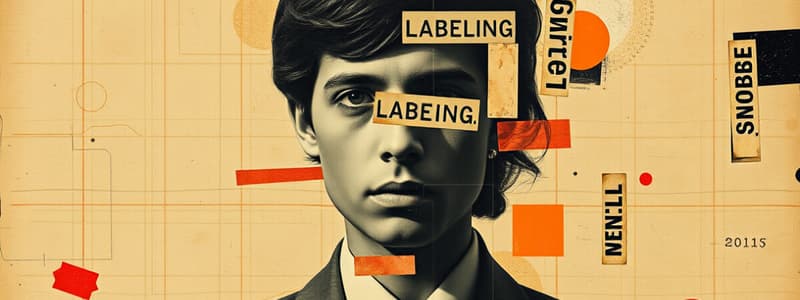Podcast
Questions and Answers
What does labeling theory propose?
What does labeling theory propose?
- Social interactions can lead to criminal behavior. (correct)
- Labeling an individual as a criminal has no effect on their actions.
- Individuals are always responsible for their criminal actions.
- Society influences a person's behavior and actions. (correct)
Labeling theory focuses primarily on the individual's personal behavior.
Labeling theory focuses primarily on the individual's personal behavior.
False (B)
Who introduced the concepts of primary and secondary deviance?
Who introduced the concepts of primary and secondary deviance?
Edwin Lemert
What is primary deviance?
What is primary deviance?
What is secondary deviance?
What is secondary deviance?
Which of the following is a key concept of labeling theory?
Which of the following is a key concept of labeling theory?
The origins of labeling theory lie in Frank Tannenbaum's book titled _____ and the Community.
The origins of labeling theory lie in Frank Tannenbaum's book titled _____ and the Community.
What do most criminological theories focus on?
What do most criminological theories focus on?
Flashcards are hidden until you start studying
Study Notes
Labeling Theory
- Labeling theory posits that societal labels, such as "criminal," influence an individual's identity and behavior, leading to increased likelihood of criminal actions.
- Originated from Frank Tannenbaum's work, Crime and the Community, emphasizing the impact of societal reactions on offenders.
- Deviance is defined as behavior that violates societal norms; labeling theory highlights how negative societal interactions can exacerbate criminal tendencies.
- Primarily affects juveniles, as labeling can encourage them to embrace delinquent roles after being tagged for minor offenses.
Long-term Effects on Criminals
- Long-time offenders may struggle to discard criminal identities, making rehabilitation challenging.
- Adolescents are more adaptable and can be guided to understand and reject criminal behavior.
- The U.S. criminal justice system aims to mitigate labeling effects by diverting youth offenders to detention centers and imposing community service rather than jail time.
Contributions by Edwin Lemert
- Lemert expanded labeling theory by introducing two forms of deviance: primary and secondary deviance.
- Primary deviance refers to initial, minor deviant acts that do not alter one's self-perception; often seen as insignificant.
- Secondary deviance occurs when individuals internalize societal labels (e.g., "thief") and identify with their stigma, perpetuating further criminal behavior.
Comparison with Other Criminological Theories
- Unlike traditional criminological theories that focus on the offender’s actions, labeling theory highlights external influences from the offender's social environment.
- Key social actors impacting criminal behavior include law enforcement, family, peers, and community members; their negative perceptions can lead to criminal identity formation.
- The labeling process fosters an environment where individuals adapt and conform to the labels imposed by society, reinforcing criminal behavior.
Studying That Suits You
Use AI to generate personalized quizzes and flashcards to suit your learning preferences.




